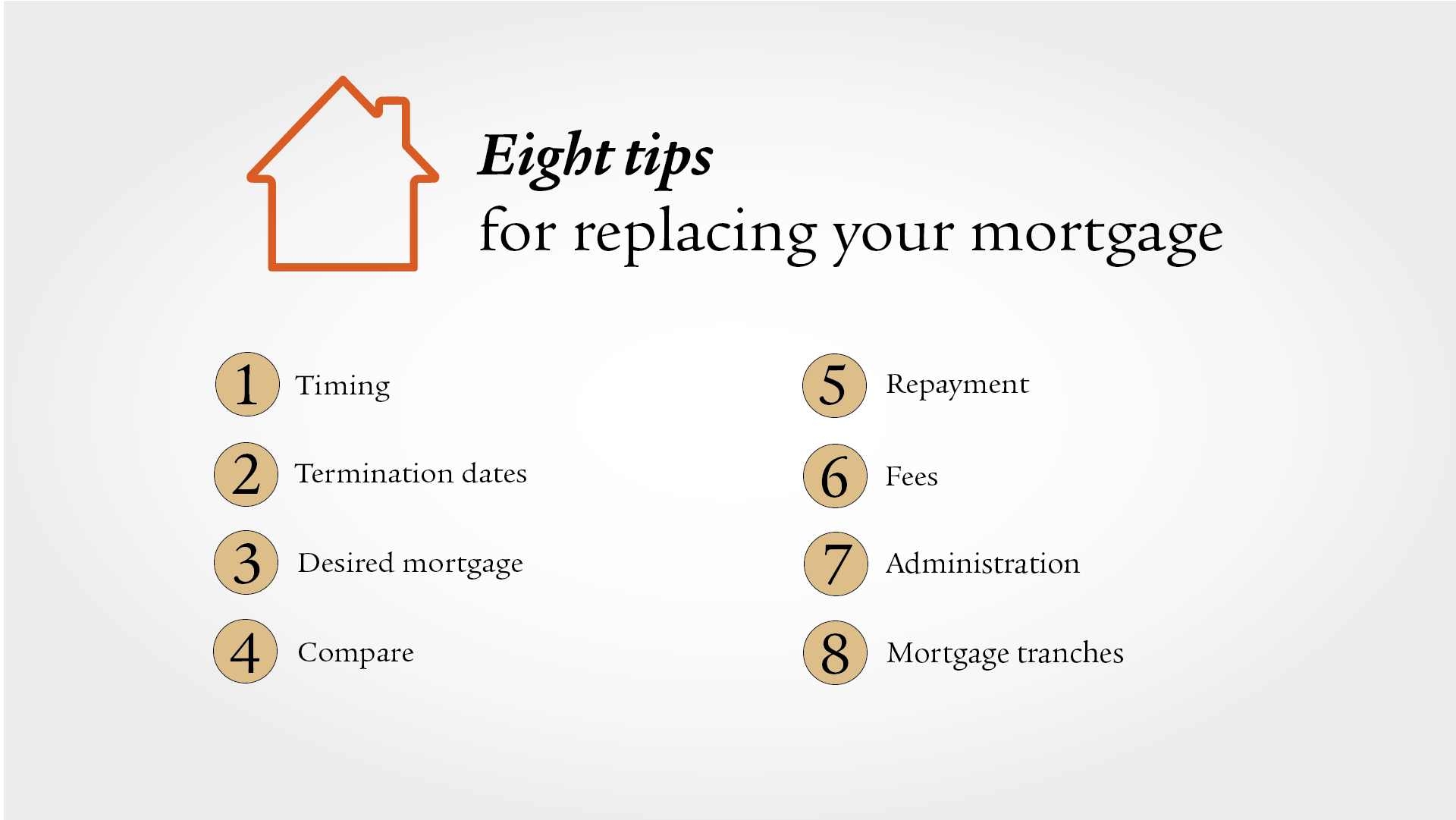Will your mortgage expire soon or do you want to change it? Not all mortgages can be paid off at any time, especially if you have two or more mortgage tranches. Swiss Life has eight useful tips on what to keep in mind when replacing your mortgage – for a self-determined life in your own four walls.
You’ve bought your own home, and taken out a mortgage. For now, there are no more major tasks for you when financing your own home. You should nevertheless remain alert. It's a good idea to review the market situation well before your mortgage expires, and to consider extending it.
If the interest rates seem attractive, you can secure them up to two years before your mortgage expires, and take out a new mortgage. We have eight useful tips for replacing your mortgage.


Eight tips for replacing your mortgage
1. Choose the right moment
There are different “rules” to observe, depending on the type of mortgage:
- You should only pay off a fixed-rate mortgage at the end of the term. If you terminate your fixed-rate mortgage early, you will usually have to pay a high fee, known as an early repayment penalty. This is rarely worthwhile.
- SARON mortgages also have a framework contract with terms of three or five years, and early termination will incur high fees. Some mortgage providers will allow you to switch internally to a fixed-rate mortgage, which may make sense if you expect interest rates to rise sharply.
- If you have taken out a variable mortgage, it is easy to switch to another provider. There is no minimum term and you can replace your mortgage after a notice period of around three to six months.

2. Write down your termination dates
A calendar entry in the distant future could save you a lot of trouble. Make a note of the termination date of your mortgage. Some providers will extend the mortgage automatically at the end of the term, and will often convert it into a variable mortgage.
Find out in good time what notice periods apply to your mortgage contract. As a rule, the deadlines are between three and six months.
3. Choose your desired mortgage
Think about the details of your future mortgage before you replace your current one. Ask yourself the following questions:
- How much do I need to borrow?
- Can I already pay off part of the mortgage?
- Which mortgage best suits my lifestyle? Fixed, SARON or variable?
- What term should the mortgage have?
- How many mortgage tranches do I want?
If you know what you want from your new mortgage, it is much easier to compare. You should also obtain offers on the same day, or enquire about the conditions for the same key date.
4. Compare
It's worth monitoring the mortgage market and regularly comparing offers, regardless of whether or not you want to change your mortgage provider. Good research pays off, and borrowers willing to switch usually benefit from cheaper financing offers.
Compare now
With our virtual assistant, you can receive offers for replacing your mortgage in just a few clicks.
5. Paying off your mortgage
When you replace your mortgage, you can take the opportunity to pay off, i.e. amortise, part of it. At the same time you can decide how you want to pay off your new mortgage. There are two ways to do this: direct or indirect amortisation.
Direct amortisation is when you pay back the debt in regular instalments. This reduces your mortgage and interest burden, but also increases your tax burden. With indirect amortisation, you can accumulate the amortisation amount in a 3a pension savings account or a 3a policy, and thus repay the entire second mortgage in one go when you retire. In most cases, this option is more advantageous or less expensive, as you can deduct the annual repayment instalments from your taxable income.
You can find out more about the two repayment types and their advantages and disadvantages in the article "Amortisation of mortgages in a nutshell".
6. Fees
When replacing your mortgage, you should find out what fees may apply if you terminate it or switch provider. Some providers charge flat rates of up to CHF 500. You can find an overview of the fees in your mortgage contract.
You should also bear the fees in mind when comparing mortgages. There are sometimes big differences, which can significantly downgrade an offer.
SwissFEX
With our SwissFEX platform, you can find mortgages from numerous financing partners, which you can compare in order to benefit from the best conditions.
7. Administration
If you change providers when replacing your mortgage, you don’t need to worry about too much administrative work. Switching is usually straightforward. The new provider will handle the mortgage notes and transfer the money for replacement of the mortgage.
8. Take care if you have several mortgage tranches
You usually finance your own home with several mortgage tranches. There are therefore two scenarios when replacing your mortgage: You replace one tranche only, or two or more tranches expire at the same time and are replaced.
Replacing one tranche
If you have two mortgage tranches with different terms, you can only replace them if the terms are less than two years apart. The tranche with the shorter term can then be replaced. If the terms of the tranches are more than two years apart, they cannot be replaced.In this case, you will need to extend the tranches until both expire at the same time or within two years of each other.
Replacing two tranches
If you have two or more mortgage tranches expiring at the same time, you can replace the mortgages early without any delays or extensions.
Do you have any questions about replacing your mortgage?
Our experts will be happy to advise you. Free of charge and with no obligation.
Good to know
Your second mortgage must be paid off within 15 years or by the time you retire.
Why do people have two mortgages?
The first mortgage finances 65% of the property. As the property provides security for the mortgage, the provider's risk is very low even in the event of value fluctuations. The second mortgage covers other financing requirements up to a maximum loan-to-value, i.e. debt financing of 80% of the property. Only the second mortgage has to be repaid within 15 years or by retirement at the latest.
As of when can I replace or extend my mortgage?
In principle, you can replace or extend mortgages from two years before the term expires. Although you may pay a surcharge on the interest conditions for an immediate extension (known as a forward surcharge), this allows you to secure the interest rates for the future.
Image source: Unsplash, Clem Onojeghuo




